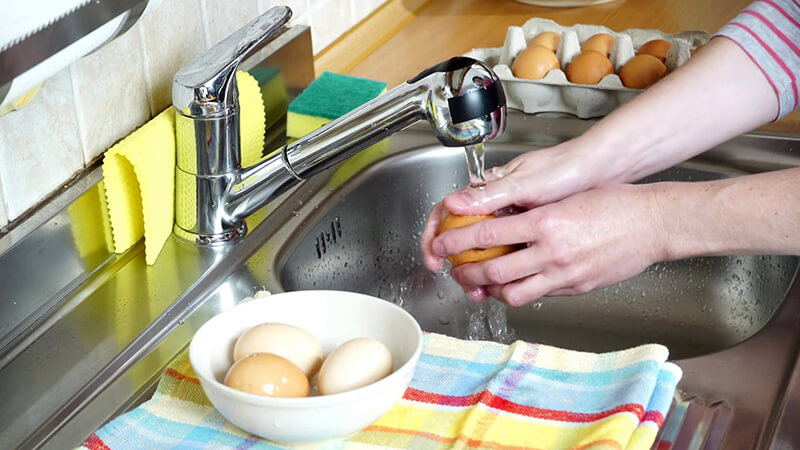According to Dr. Phan Bich Nga, MD, of the National Institute of Nutrition, eggs are a very familiar daily food that is suitable for all ages. Therefore, proper cleaning and handling are always important and warrant attention.
So, should you wash eggs bought from the supermarket? Let’s find out together.
Should You Wash Eggs Bought from the Supermarket?
According to Dr. Nga, newly laid eggs are always covered with a pinkish powder on the shell. This layer acts as a protective barrier to prevent bacterial invasion.
However, Dr. Nga also mentions that due to the laying process, which involves contact with chicken/duck feces, the eggs may harbor a significant amount of bacteria. Notably, Salmonella bacteria can cause a high rate of infection.
Given this information, here are some recommendations from nutrition experts (specifically for eggs bought from supermarkets):
For Immediate Consumption

Most eggs bought from supermarkets appear clean to the naked eye. However, they may still have traces of fecal matter, such as uric acid crystals from the urine of the laying bird.
When a bird lays an egg, there is a protective mucus layer on the surface, but this mucus can attract and hold onto dirt and fecal matter. As a result, the egg’s surface may have a high bacterial count, increasing the risk of bacterial invasion into the egg.
It is best to rinse the eggs with diluted water or simply clean water, and then dry them before cooking.
For Room Temperature Storage

You should not wash the eggs before storing them at room temperature. Washing will remove the protective pinkish powder on the shell, which not only makes the eggs shinier but also helps seal the air pores. This prevents dust and bacteria from entering the egg.
If you wash the eggs and remove this protective layer, it will be easier for air to penetrate the egg, causing it to spoil faster.
Therefore, when you buy eggs from the supermarket, simply place them in a carton or plastic container and store them at room temperature. Only wash the eggs just before using them.
For Refrigerator Storage

Similar to room temperature storage, it is not necessary to wash eggs bought from supermarkets before placing them in the refrigerator. However, to ensure better hygiene and prevent any potential bacterial contamination of other foods, you can store them in a dedicated container or wrap them individually before placing them in the refrigerator’s cold storage compartment.
If you are particularly concerned about dirt, fecal matter, or other contaminants on the egg’s surface, you may gently wipe the eggs with a damp cloth and then thoroughly dry them before placing them in the refrigerator.
Note: If you have already stored the eggs in the refrigerator, it is recommended to keep them there and not take them out to room temperature (unless you plan to use them immediately). The higher temperature outside the fridge can cause tiny water droplets to form on the shell and penetrate the egg. This reduces the egg’s ability to resist bacteria, increasing the likelihood of spoilage.
In summary, whether or not to wash eggs bought from the supermarket depends on your intended use and storage method.
Important Notes on Egg Storage

When storing eggs, it is recommended to keep the smaller end of the egg facing downward and the larger end upward. This helps prevent the yolk from floating and sticking to the shell, and it may also improve the effectiveness of blocking bacterial invasion.
Avoid storing eggs with strongly scented foods that contain essential oils, such as onions, garlic, leeks, and scallions. The scents from these foods can penetrate the eggs through the shell’s pores, causing the eggs to spoil. If stored for an extended period, the eggs may even become rotten.
It is recommended not to store eggs bought from supermarkets for more than 30 days. Ideally, they should be consumed within 7 to 10 days. Eggs that have been removed from the refrigerator should be used within 2 hours, as they will spoil if left at room temperature for too long.
You can extend the shelf life of eggs by coating them with vegetable oil such as canola oil, soybean oil, or corn oil. This method can preserve the eggs for up to 36 days and is suitable for temperatures between 25–32°C (77–90°F).

When storing eggs in the refrigerator, only take out as many eggs as you need for your intended use. Avoid removing the entire tray and then putting it back, as this may compromise the quality of the eggs.
We hope that through this article, you have gained a better understanding of egg handling and storage practices. We aim to provide informative content to help you safely manage and preserve your eggs, ensuring a healthy and enjoyable culinary experience.
Are You Making a Huge Mistake by Storing Eggs in this Fridge Spot? Switch It Up Before Your Eggs Go Bad!
 Eggs Go Bad!’>
Eggs Go Bad!’>Apart from eggs, milk, butter, and dairy products should not be stored in the refrigerator door.





































